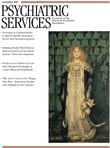Chris Bohjalian is a favorite author of mine. He wrote Midwives, Before You Know Kindness, Buffalo Soldier, and Trans-Sister Radio, among others. Each of these books catapults the reader into one or another provoking societal issue. A review of any would fit easily into the book review section of Psychiatric Services . The Double Bind, Bohjalian's tenth book, takes on issues of mental illness and homelessness directly.
The novel, like Bohjalian's other works, is complex and difficult to describe. It is half-sequel to The Great Gatsby and half suspense. Its references to Gatsby are so confident that halfway through The Double Bind I set it aside to reread Gatsby and assure myself that it too is fiction, not history.
The Double Bind 's protagonist is Laurel, a college sophomore who is attacked and nearly killed while bicycling in rural Vermont. She withdraws from her previous life but eventually finishes a degree in social work and, fast-forward a few years, works for a homeless shelter in Burlington. When a mentally ill, homeless man named Bobbie Crocker dies, he leaves a collection of photographs of famous people and, eerily, of a girl on a bicycle on the very rural road where Laurel was attacked, perhaps Laurel herself. To complicate matters, there are other images of where Laurel grew up, which is near Gatsby's cousin Daisy Buchanan's home in West Egg, the fictional setting of The Great Gatsby .
Interestingly, Bohjalian, in an author's note, tells the reader that the photos of famous people really were in the possession of a real homeless man who died in a homeless shelter in Burlington. Several of the pictures are reproduced in the book and feature Chuck Berry, Muddy Waters, Walt Whitman, Martin Luther King, and other famous figures.
Bohjalian treats issues of both mental illness and homelessness with empathy and compassion. Excerpts of the progress notes of Bobbie's state hospital psychiatrist lend an air of authenticity to the story. Imagining that Bobbie was an amazing photographer before homelessness and institutionalization got in the way adds warmth to the book, and anger comes from Bobbie's fictional family, the Buchanans, abandoning him because of shame about his mental illness.
Laurel launches into a search based on the photographic clues. The search is actually two searches—one to discover the real identity of Bobbie Crocker and one to discover herself. The book's title hints at the twist ending, but I didn't see it coming.
Complexity, photography, and F. Scott Fitzgerald aside, the writing is occasionally stilted, choppy, and awkward, especially in the first half of the book. Many passages seem to come from a first-time writer who has a good idea but can't figure out how to express it through the characters' dialogue. Eventually the read is worth your time, and it could keep you up all night.

